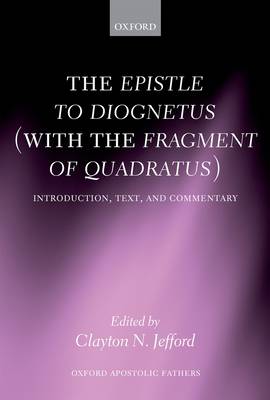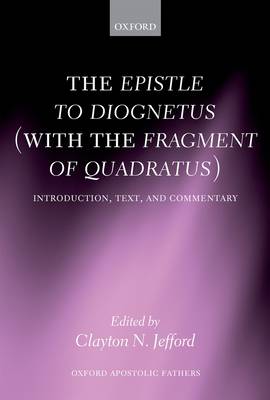
- Afhalen na 1 uur in een winkel met voorraad
- Gratis thuislevering in België vanaf € 30
- Ruim aanbod met 7 miljoen producten
- Afhalen na 1 uur in een winkel met voorraad
- Gratis thuislevering in België vanaf € 30
- Ruim aanbod met 7 miljoen producten
Zoeken
The Epistle to Diognetus (with the Fragment of Quadratus)
Introduction, Text, and Commentary
Clayton N Jefford
€ 293,95
+ 587 punten
Omschrijving
This volume is the first major English-language commentary on the Epistle to Diognetus since that of Henry G. Meecham in 1949. Its purpose is twofold: to provide careful consideration to the essential introductory issues of authorship and setting, structure and integrity, theology, relationship to scripture, and historical trajectory as they apply to the transmission of the text; and to offer commentary focused on the movement of the author's argument and objectives in construction of the narrative, taking advantage of critical considerations of the apology within recent scholarship. In the final analysis the volume arrives at the premise that the core materials of Diognetus were likely delivered first in an oral context whose setting remains unknown and were thereafter recorded by a later hand as the framework of chapters 1-10. A subsequent editor (perhaps Clement of Alexandria) added the concluding materials of chapters 11-12 together with the insertion of numerous hymnic
segments and theological phrases throughout chapters 1-10. These additions were inspired by Johannine tradition and reflect the setting of a living faith community. The text of Diognetus thus reflects an evolutionary process that moves from oral performance to literary record, from moral teaching to theological homily. The format of the volume is designed to welcome the non-specialist to the text of Diognetus while exposing the reader to the best of both earlier and more recent critical comments on the writing and its tradition.
segments and theological phrases throughout chapters 1-10. These additions were inspired by Johannine tradition and reflect the setting of a living faith community. The text of Diognetus thus reflects an evolutionary process that moves from oral performance to literary record, from moral teaching to theological homily. The format of the volume is designed to welcome the non-specialist to the text of Diognetus while exposing the reader to the best of both earlier and more recent critical comments on the writing and its tradition.
Specificaties
Betrokkenen
- Auteur(s):
- Uitgeverij:
Inhoud
- Aantal bladzijden:
- 304
- Taal:
- Engels
- Reeks:
Eigenschappen
- Productcode (EAN):
- 9780199212743
- Verschijningsdatum:
- 15/10/2013
- Uitvoering:
- Hardcover
- Formaat:
- Genaaid
- Afmetingen:
- 236 mm x 160 mm
- Gewicht:
- 603 g

Alleen bij Standaard Boekhandel
+ 587 punten op je klantenkaart van Standaard Boekhandel
Beoordelingen
We publiceren alleen reviews die voldoen aan de voorwaarden voor reviews. Bekijk onze voorwaarden voor reviews.











